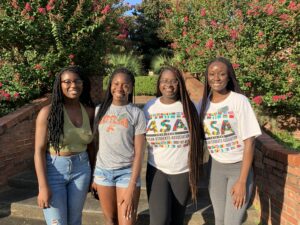
At any Florida A&M University function you are sure to hear students repping where they are from:
“404.” “850.” “478.” “DUUUVALL.”
However, then- freshman political science student Nykia Onubogu felt like a space for African students was missing, and she wanted to fill that void. After a little research Onubogu, who is Nigerian, found out about FAMU’s African Student Association and, having some ideas of her own, applied in fall 2019 for president of the organization.
“I don’t remember too many Africans at my school so when I came here I wanted to be around people with my same upbringing,” Onubogu said.
“When I got the opportunity to actually be a part of the African Student Association, I wanted to do it so other people can have this opportunity as well.”
Some of those people are Kinesso Kombate, a biology student from Togo, Muna Okoli, a pharmacy student from Nigeria, and Noyimot Ibrahim, who’s also a pharmacy student from Nigeria. Kombate, Okoli and Ibrahim were all eager to not just join ASA, but to work to make the organization even better. They serve as members of the executive board, alongside Onubogu.
“I want the ASA to be a home away from home … because those little annoying things from home, you miss it,” Okoli said.
While ASA is home away from home for many of its members, everyone present stressed that ASA is for anyone who wants somewhere they feel welcome or just want to learn about something new.
In the past few years there’s been a huge switch where talking about and demonstrating African culture and customs have become “cool” and “trendy.” On the popular social media platform TikTok, the hashtag “africantok” has 3 billion views. The positive thing is more people are becoming educated on different cultures, but a lot of misinformation is out there too. ASA can stand in that gap, and try to not just educate, but expose other students to something they might have never otherwise seen before or might have been shown to them incorrectly.
“I look at ASA as a safe space, but also as a place for people who aren’t educated on African culture and don’t know who to ask,” Ibrahim said.
As for the future, ASA hopes to be able to put on events and share their customs and culture with anyone willing to learn. ASA invites everyone to come “dig deeper and explore their roots.”